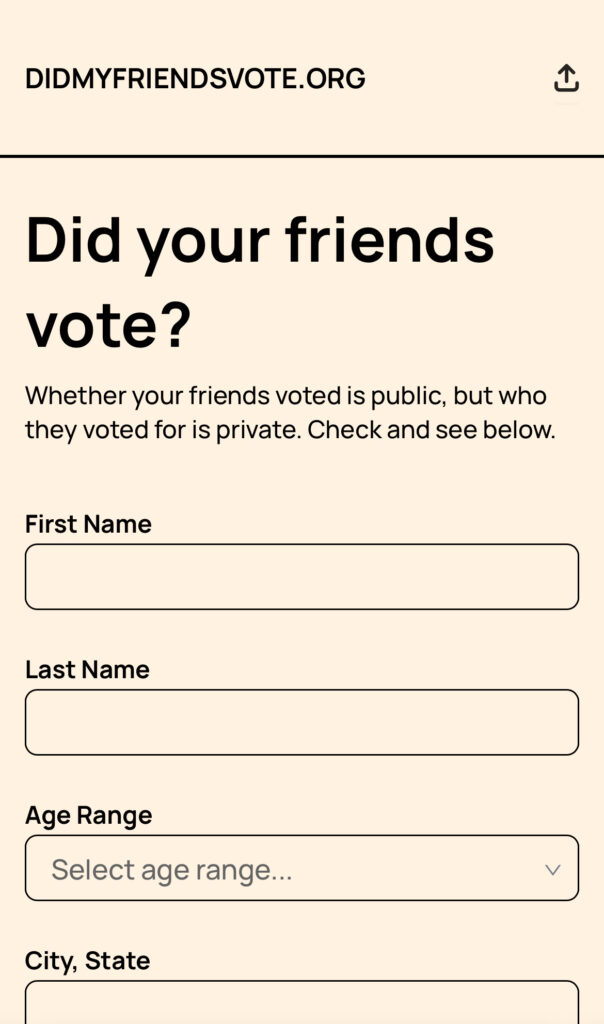
As election seasons come and go, voters across the U.S. are increasingly aware of how their participation in elections is tracked and shared.
One website, called “Did My Friend Vote”, claims to provide access to public voter information, allowing users to check if people they know participated in recent elections. This raises concerns about privacy, legality, and whether such a tool could have broader implications on careers and personal life.
The website is based on voter records being considered public information in many states. While these records do not disclose who someone voted for, they may show if a person voted in a particular election. According to proponents of such websites, these platforms are intended to promote civic engagement and accountability, encouraging more people to vote by making voting records easily accessible.
But can this transparency be problematic?
Mark Earley, the Supervisor of Elections in Leon County, Florida, has spoken about the importance of public voting records, emphasizing that such transparency has long been a cornerstone of American democracy. However, he also warns that using this information inappropriately could undermine trust in the system.
SJGC’s Bureau reached out to Mark Earley, the Supervisor of Elections in Leon County, Florida, about the importance of public voting records, emphasizing that such transparency has long been a cornerstone of American democracy. At the time of publication, I am still awaiting his statement.
There are some significant concerns about how publicizing this information can be misused. In the age of digital privacy issues, the idea that anyone can check up on whether you’ve voted could feel invasive. While legally, this information is public in many jurisdictions, how it is used can make all the difference.
To gain a deeper understanding of the legal and ethical implications, I reached out to employment law attorney Tiffany Cruz for her expertise on how voter data may affect employment decisions.
“In Florida, it would be illegal for an employer to terminate or threaten to terminate an employee for voting, or not voting, in any election. It is a third-degree felony if an employer violates this statute. In addition to criminal penalties, there may be Civil protections afforded to employees if their employer took adverse action against them based on who or what they voted for or against,” Cruz told SJGC Bureau.
One of the core issues is whether using voter participation data in certain contexts—like employment or social settings—could have a negative impact. While federal law protects individuals from discrimination based on political beliefs or affiliations, some fear that voter data could be used in ways that unfairly affect people’s personal or professional lives.
Legally, employers cannot base hiring, firing, or promotion decisions on whether or not someone votes. Voting is a right, and not voting is not a legal basis for discrimination. However, the potential for misuse of this kind of information is what concerns many people. In smaller or more politically sensitive environments, could non-participation in elections lead to assumptions or judgments about a person’s values or work ethic?
For example, a hiring manager might check the site and make a negative assumption about someone who didn’t vote in the last election, even though that’s illegal and unethical. Moreover, in the age of social media, the idea that someone’s voting habits could be used to shame them or diminish their opportunities in the workplace isn’t out of the realm of possibility.
Beyond the workplace, the use of these websites could also affect social dynamics. Knowing whether a friend or family member voted could lead to strained relationships, especially in politically polarized environments. While this transparency is legal, there are questions about its ethical implications and the effect on personal trust.
Sean Pittman, a respected attorney and civic leader, provided insights into the broader ethical concerns.
While I generally support creative measures for maximizing and increasing voter participation, I don’t believe shaming individuals is the best way to encourage an engaged electorate. As I discuss in my book Disaffected, we must focus on the symptoms of disengaged voters and attack the systems that create political apathy,” Pittman said in a statement.
In highly charged political climates, the decision to vote or not vote can carry a heavy weight. Websites like “Did My Friend Vote” make it easier to expose people’s civic engagement choices, potentially turning voting into a divisive social issue.
While the “Did My Friend Vote” website operates within the boundaries of public information laws, it raises important questions about privacy, ethics, and potential misuse. While your right to vote—or not vote—is protected, the ease with which others can access this information could have unintended consequences for both your career and personal life. Voters should be aware of how their data is being used and consider the broader implications of such transparency.
As voter participation tools become more common, it’s essential to maintain a balance between encouraging civic engagement and protecting individual privacy.